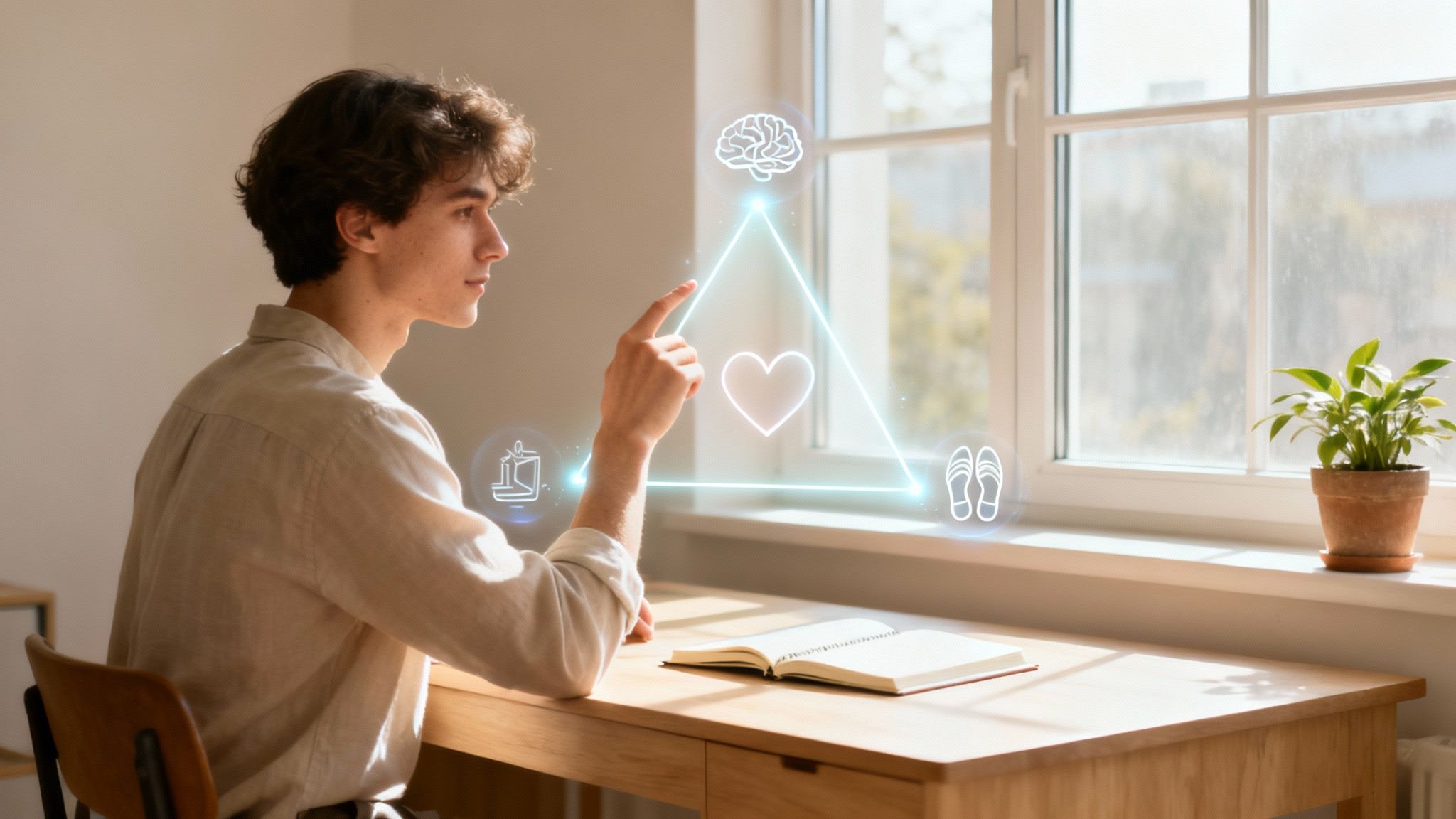If you need a quick boost, you may drink coffee, grab a bite to eat, or even take a pill to raise energy levels. These “energy pills” usually contain ingredients known as nootropics.
Nootropics are cognitive enhancers that can help you stay alert and focused. For ADHDers, these “smart drugs” are more commonly known as ADHD medications like Ritalin and Adderall.
Read on to learn about nootropics and determine the best-performing supplements for ADHDers.
Disclaimer: The information provided in this article is for informational purposes only and is not intended to be a substitute for professional medical advice, diagnosis, or treatment. Speak with your medical provider or pharmacist about any questions or concerns you may have about medications, supplements, and their potential side effects.
Too long; didn’t read
- Nootropics are brain boosters that can help with cognitive function, such as improved memory and attentiveness.
- Nootropics are available as prescription medications and over-the-counter (OTC) supplements.
- Herbs and botanicals, like rosemary oil and ginkgo biloba, are alternatives to prescription nootropics.
- Some of the most effective nootropics for ADHDers include amphetamines (e.g., Adderall), modafinil, caffeine, and L-tyrosine.
- Nootropic stacks combine more than two nootropics, sold by brands like Vyvamind, Alpha Brain, NooCube, and Mind Lab Pro.
Typical treatment options for ADHD
There is no cure for ADHD, but there are available treatments ADHDers can pursue to manage their symptoms.
Examples of possible ADHD treatment options:
- Medication (stimulants and non-stimulants)
- Psychotherapy, like cognitive behavioral therapy (CBT)
- Stress management techniques
- Support groups
- Nootropics
What are nootropics?
Nootropics are substances that can enhance cognitive performance. Some people use these “smart drugs” to improve their academic or work performance. These cognitive enhancers, like healthy eating and regular physical exercise, can boost brain activity.1
Neurotransmitters are chemical messengers that send signals throughout the body. Examples include dopamine, norepinephrine, and epinephrine. In addition, nootropics can alter the availability of neurotransmitters to boost mental functioning.
The potential benefits of using nootropics involve glucose (or blood sugar) levels in the brain. Glucose fuels the brain, improving thinking, memory, and learning.2 However, the presumed effects are often more prevalent in individuals with impaired brain function.3
Neurological disorders that may benefit from nootropics include:
- ADHD
- Alzheimer’s disease
- Dementia
- Parkinson’s disease
Types of nootropics
1. Prescription nootropics
Prescription nootropic medications are approved by the Food and Drug Administration (FDA). Adderall and Ritalin are nootropic prescription drugs.
Most nootropics prescription medications contain eugeroics, chemicals that induce alertness and wakefulness. Commonly known eugeroics are drugs like modafinil, adrafinil, and armodafinil.4
2. Over-the-counter (OTC) nootropics
A few nootropics don’t require a prescription:
- Caffeine: contains a nootropic compound (CAF+) that boosts cognitive performance5
- L-theanine: commonly used as a sleep aid or to relax the mind
- Racetam: improves brain function for completing attention-based activities
3. Nootropic supplements
Nootropic supplements, which may or may not require a prescription, often contain natural ingredients, like herbs or botanicals. However, it’s crucial to note that most nootropic dietary supplements are not FDA-approved, so users should be cautious when taking them.
Common nootropic dietary supplements include:6
- Bacopa monnieri
- Acetyl L-Carnitine
- Gingko biloba
- Phosphatidylserine (PS)
- St. John’s wort
- Rosemary oil (oral or inhaled)
- Dimethylaminoethanol bitartrate
- Vinpocetine
How can nootropics help with ADHD symptoms?
ADHDers who take nootropics, specifically prescription medication, can see a significant change in their symptoms. Psychostimulants, such as Ritalin and Adderall, can help ADHDers manage their symptoms.
Psychostimulants are first-line drugs for ADHD treatment proven to be effective in improving the symptoms associated with ADHD.7
Prescription nootropics for ADHDers include:
- Dexedrine
- Dextroamphetamine sulfate
- Methylphenidate
- Nicotine (beneficial for people who want to quit smoking)
The top four cognitive-enhancing nootropics for ADHDers
If you’re an ADHDer looking for a brain boost, here are the top-performing nootropics to manage your symptoms.
- Adderall: a first-line medication for treating ADHD symptoms
- Modafinil: a class of non-amphetamine medicine that helps with alertness and wakefulness
- Caffeine: can improve brain function when consumed in moderation
- L-tyrosine: a precursor to dopamine that can help reduce ADHD symptoms
Side effects of nootropics
Like any medication or dietary supplement, nootropics can have side effects. Some reactions are mild, while others may be more severe depending on the nootropic and the amount ingested.
Common side effects of nootropics are:
- Headaches
- Dizziness
- Insomnia
- Nervousness
- Tachycardia (heart rate of more than 100 beats per minute)
Please seek medical attention if you’re experiencing any side effects after consuming nootropics.
Well-known nootropics for ADHD
Nootropic stacks combine two or more nootropic supplements that can provide several cognitive-enhancing benefits. They can be a one-stop shop for getting multiple nootropic ingredients within one pill.
Here are some popular nootropic stack brands for ADHDers:
- Vyvamind
- NooCube
- Alpha Brain
- Mind Lab Pro
If you’re an ADHDer taking prescription medications, you already consume a certain amount of nootropics daily. However, if you’re looking for additional ways to manage your ADHD symptoms, you may consider alternative nootropic supplements, like herbs, caffeine, or other dietary supplements.
Please consult your doctor before consuming any nootropic supplements.
Sources
1 Frontiers in Psychiatry | Pharmacological Human Enhancement: An Overview of the Looming Bioethical and Regulatory Challenges
2 Journal of Clinical Medicine | Brain Glucose Metabolism in Health, Obesity, and Cognitive Decline—Does Insulin Have Anything to Do with It? A Narrative Review
3 Nutrients | Nootropics as Cognitive Enhancers: Types, Dosage and Side Effects of Smart Drugs
4 Psychiatria Polska | The role of eugeroics in the treatment of affective disorders
5 Journal of Cognitive Enhancements | A Combination of Nootropic Ingredients (CAF+) Is Not Better than Caffeine in Improving Cognitive Functions
6 Journal of Pharmacognosy and Phytochemistry | Search for a perfect Nootropic supplement combination – Can we increase human intelligence by nutritional supplements?
7 Applied Science | Effectiveness of Psychostimulant and Non-Psychostimulant Drug Therapy in the Attention Deficit Hyperactivity Disorder

.png)






